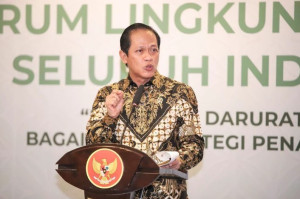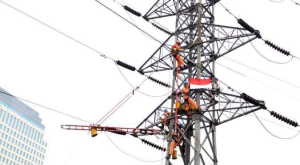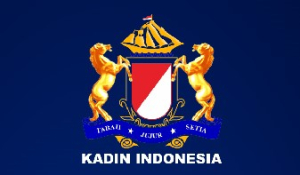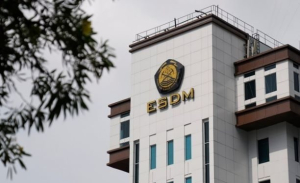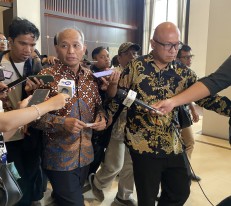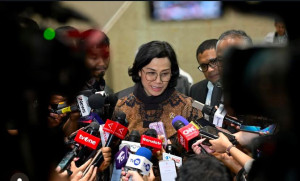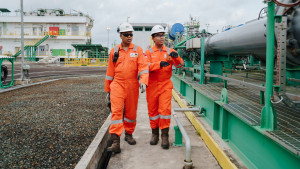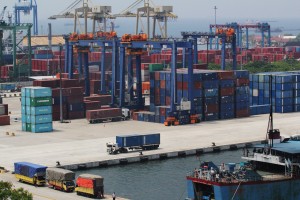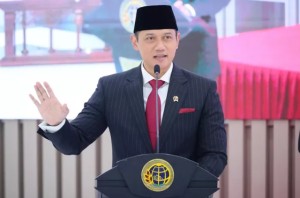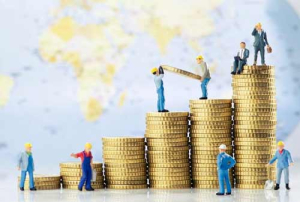National Resilience
The nation’s ability to manage and recover from challenges is evaluated through its strategies in food security, defense, and energy preparedness. This section assesses Indonesia’s effectiveness in tackling crises and ensuring national resilience.
Defense, Finance ministers visit Papua to boost energy security, State synergy
In a significant display of State presence and cross-sector synergy, Defense Minister Sjafrie Sjamsoeddin and Finance Minister Sri Mulyani Indrawati visited conflict-prone areas in Papua on Saturday and Sunday, June 7-8, 2025., underscoring the government’s strategy to bolster national security and energy resilience, particularly through biofuel development.
Environment Ministry-Police strengthen collaboration on environmental protection
The Ministry of Environment (KLH) and the National Police (Polri) on Wednesday, May 28, 2025 signed a memorandum of understanding (MoU) on strengthened environmental law enforcement, underscoring both institutions’ commitment to preserving Indonesia’s natural resources and ensuring sustainable development.
PLN-Lemhannas forge strategic alliance to strengthen national energy resilience
State electricity company PT PLN is exploring a strategic partnership with the National Resilience Institute (Lemhannas) to align energy policy development with the country’s long-term economic growth trajectory and industrial acceleration.
Kadin invites Chinese entrepreneurs to invest in “free nutritious meal program”
The Indonesian Chamber of Commerce and Industry (Kadin) has invited Chinese business leaders to invest in the country’s Makan Bergizi Gratis (MBG), or Free Nutritious Meal Program, targeting the development of 1,000 community kitchens to support child nutrition and food security.
Bahlil alleges deliberate decline in Indonesia’s oil output
Minister of Energy and Mineral Resources (ESDM), Bahlil Lahadalia, has claimed that the sharp decline in national oil production was not merely a result of depleting natural resources, but also a possibly deliberate move.
PGN Synergy secures domestic gas supply through swap gas agreement
With government’s support, PT Perusahaan Gas Negara (PGN) has secured additional gas supply to meet growing domestic demand after the State-owned gas company signed two strategic agreements − a Domestic Swap Agreement and a Gas Sales Agreement − with the West Natuna Group.
Shell, TotalEnergies, and Chevron to reinvest in RI's upstream oil&gas sector
Twenty-five oil and gas companies, including major global players such as Shell, Chevron, and TotalEnergies, have expressed strong interest in exploring Indonesia’s upstream energy sector, a top government official revealed.
Government eyes up to 5.8 percent economic growth in 2026
Minister of Finance Sri Mulyani Indrawati revealed on Tuesday, May 20, 2025 the government’s 2026 macroeconomic framework and fiscal policy guidelines (KEM PPKF), projecting national economic growth to reach between 5.2 and 5.8 percent next year.
ESDM ministry sticks to 1-million BOPD target by 2030 despite challenges
The Ministry of Energy and Mineral Resources (ESDM) has reaffirmed its commitment to achieving the national oil production target of 1 million barrels of oil per day (BOPD) by 2030, despite mounting doubts about the target feasibility.
Government affirms import deregulation remains measurable
The government has emphasized that the import deregulation plan will not be carried out carelessly and will continue to consider national interests, especially domestic producers and industries.
Prabowo assigns AHY to lead new authority body for “Giant Sea Wall” development
President Prabowo Subianto has ordered the Coordinating Minister for Infrastructure and Regional Development Agus Harimurti Yudhoyono (AHY) to set up an authority body related to the construction of the “Giant Sea Wall” along Java coastal regions.
Govt, economists confident on RI’s economic resilience amidst global uncertainty
Indonesia’s economy remains resilient despite global uncertainties fueled by shifting geopolitical dynamics and U.S. trade tariff policies, which have disrupted the global trade environment.


